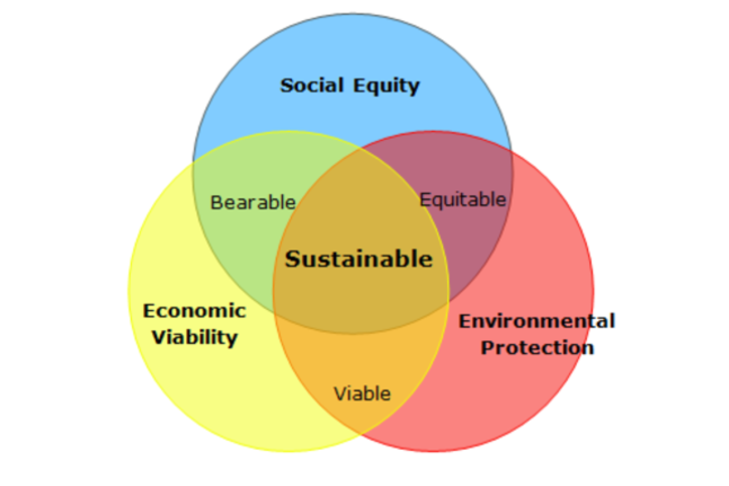By Ruchika Arora
Abstract
Sustainability, an environmentally driven concept, has become a driving force all around the globe to delay the effects of climate change. In an attempt to make economies “green”, there has been a disproportionate overload on the “environmental” pillar of sustainability to others pillars, especially the social pillar of sustainability. The correlation among all pillars to balance sustainability’s long-term effects among communities ensures a bearable, equitable and viable conditions.This essay establishes a sociological understanding to inquire social interactions and processes between humans and nature in contemporary economies. Furthermore, it will glance over the role of social activism in trying to push the vicious cycle of sustainability more to a virtuous cycle.
Introduction
Over a decade, the weight of growing cities, extensive energy consumption, deforestation, overpopulation, and mobility patterns have reduced nature’s capability to replenish fully. The environment can be stabilised with the mutual cooperation of individuals, corporations, and governmental agencies. The necessity for global action has been debated over international platforms to oversee the sustainable development of economies. The overemphasis on gearing the environmental prospect in the spirit of sustainability has only benefitted certain section of society. This essay will discuss the importance of balancing and maintaining all pillars of sustainability (economic, social and environmental) to realise a healthy and balanced growth of all communities in/ and across nations.
Sustainability – a concept or a lifestyle?
The definition of sustainability as “meeting present needs without compromising the ability of future generations to meet their own needs” propagates the balancing of present and future consumption across nations. The monetizing of nature over personal and corporate gains, e.g., selling carbon credits to satisfy legally sustainable standards, is becoming corporate’s normative behaviour. Such a strategic tactic not only compromises nature but also puts pressure on smaller companies to adjust their carbon rate thereby resulting in unequal balancing in social and environmental relations.
The growth of economy’s needs “structural changes” to prioritise “sustainability as a vital precondition for future economic growth”. The understanding of sustainability is a long-sought solution, but its implementation seeks changes in values, working patterns, and current policies to realise its full potential. Neckel explains sustainability only as a concept but as a lifestyle which is attainable to become sensitive towards our relationship with nature. The micro-plans and efforts like transition movement, cradle-to-cradle, energy descent, geo-engineering, terrace farming, and steady-state economy are some fundamental steps in orientating practices on the environmental axis.
Social Axis of sustainability
The greenness of the economy is a component of sustainability, which is yet to trigger the “social pillar” of sustainability. The social pillar seeks to emphasise the well-being of communities in totality with a primary focus on social equity, justice, and equal rights. The social pillar recognizes that sustainable development cannot be achieved without addressing social issues and improving the quality of life for all. It also invites novel innovations and democratisation of decision-making to promote voluntary actions/steps (beyond legal requirements) in favour of sustainability. The decision-making power resting in few hands only reinforces new social inequalities and power patterns, disallowing equality among members in the policy making process.
Sustainability provides emancipatory hope for complete social transformation, including economic, social relations, and ecological progress. The furthering of economic growth without
blurring lines of social inequalities weakens the concept of sustainability. E.g The installments of windmills on the Gujarat coast trouble the sleeping patterns of locals due to excessive noise at night time, also known as Wind Turbine Syndrome in Mexico. Such instances explain the partial and biased utility of sustainable plans while also unfolding the larger structural and social biases existing in the society. The policies require attention over green-oriented projects aided with potential subsidies to promote more significant investment fulfilling all pillars of sustainability alongside the regular checks and balances of emissions, minerals and resources, and ecological waste.
Activism : Vicious to Virtuous cycle
The discussion of strengthening the social pillar of sustainability is crucial to enable a trickle-down effect to all levels/groups of the society. Collective resistance against the ills of the economy indicates the cooperation among individuals seeking to defer the impacts of climate change. One of the initiatives by YASTA group, comprising young individuals from different communities targeting the Adani group’s developmental projects. “Climate politics cannot be seen in isolation of the wider socio-economic paradigm” . The continuous praxis in fighting political domination does not succumb to a vicious cycle and unfair means. “The politicized young people joining communities across the country struggling against coal mining, deforestation and wetlands destruction” anchors for locals’ rights and brings suppressed voices at forefront.
The policies need to strengthen marginalised voices to gradually shift from a vicious cycle to a virtuous cycle (see diagram), sustaining more life on Earth. The recognition of micro-level resistances and macro-level green policies would essentially commit/aid in slowing down the destruction planet. The integration of urban and rural environmental values would seek to prioritise nature above human civilization. The collaboration of indigenous techniques, scientific formulas, and eco-friendly policies would not only replenish resources but aims to eradicate poverty, social inequalities, and greedy motives. The micro-macro frameworks aiming for a common goal/good would necessitate a shift/ trigger new phrases towards a healthy economy.
Although the ground-level approach for enabling small-scale motives for, e.g Social movements, climate activism, and pressures on government exist but do not contribute to larger structural changes. Mobilising efforts collectively contributing to a push for political change can fundamentally bring change in institutions and decision-making forces. An efficient hand-in-hand improvement on the economic and social front can ensure intergenerational equity of resources and an emerging sustainable nation.

Image Credits: Ruchika Arora
Conclusion
This essay concludes that a sustainable outlook in mitigating climate risks becomes crucial in dismissing the perils of the economy. The repercussions cannot be sorted last minute without any strategic growth model capable of altering manufactured risks. Sustainability is not only a sought solution but a guiding principle that can alter growth, social, and ecological narratives. The concept of sustainability needs a wider understanding to become inclusive of needs from all communities. The emergence of individual and collective resistance is limited but a fundamental beginning to unionise their interests, leading to ecological recovery. The democratisation of a green planet could not be realised without incentivizing micro-efforts at ground level.
Author’s Bio
Ruchika Arora is a final year student of B.A Liberal Arts and Humanities in O.P. Jindal
Global University. She is doing a self-design major in Sociology-Anthropology and Literature.
Image Source: https://www.futurelearn.com/info/courses/sustainability-society-and-you/0/steps/4618

